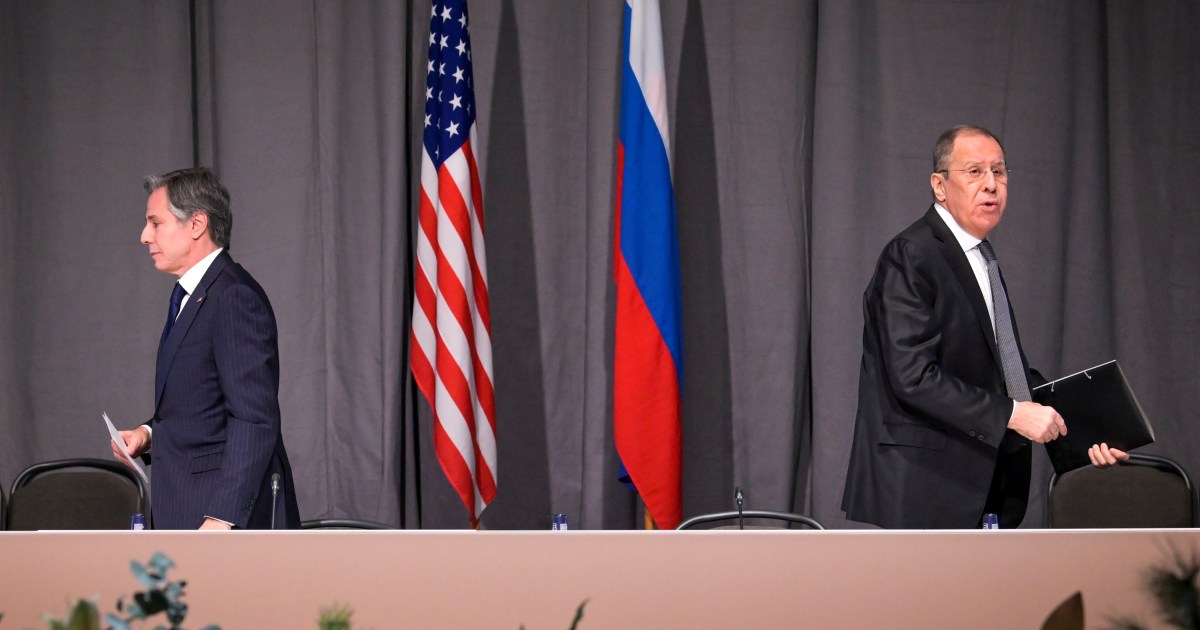The Russian Foreign Ministry said on Saturday that the dialogue between Moscow and Washington on strategic stability is currently frozen and can be resumed after the end of - what Russia calls - a "special military operation" in Ukraine, while Ukraine says that negotiations with Russia to end the war have slowed down due to "war crimes". Russia, and the Ukrainian presidency spoke of "great possibilities" for peace talks with Moscow to stop.
The Director of the Department of Non-Proliferation and Arms Control of the Russian Foreign Ministry, Vladimir Yermakov, said that it is possible to return to dialogue with the United States on the issue of strategic stability, but "after completing the tasks of the Russian special operation in Ukraine."
What is meant by the strategic stability dialogue is the rounds of talks aimed at limiting arms between the two nuclear powers.
The two sides reached an agreement a year ago to extend the New START Treaty on the reduction of nuclear arsenals for a period of 5 years.
nuclear war
In a related context, the Russian "TASS" news agency quoted Yermakov as saying that Russia believes that the risks of nuclear war should be kept to a minimum, and that any armed conflict between nuclear powers should be prevented.
The Russian official's statement came less than a week after Russian Foreign Minister Sergey Lavrov warned of the dangers of a nuclear conflict over Ukraine.
Commenting on Lavrov's statement, the United States said that it does not believe there is a threat to Russia's use of nuclear weapons, despite the recent escalation in Moscow's rhetoric.
In an interview published by the official China News Agency on Saturday, the Russian Foreign Minister called on NATO and Washington to stop supplying Kyiv with weapons "if they are really interested in resolving the Ukrainian crisis."
Lavrov said that "a continuous flow of all kinds of weapons entered Ukraine through Poland and other NATO countries," and the Russian foreign minister added, "If the United States and NATO are really interested in resolving the Ukrainian crisis, they should first of all wake up and stop supplying the Kyiv regime with weapons and ammunition."
In turn, the RIA quoted Lavrov as saying that "Russia does not consider itself at war with NATO because of Ukraine, because the occurrence of such a development would increase the risks of a nuclear war."
The fate of the negotiations
Regarding negotiations with Kyiv, Lavrov stressed that lifting the sanctions imposed on Russia is part of these negotiations, which he said are "difficult", but continue daily.
"The Russian and Ukrainian delegations are already discussing a possible draft treaty on a daily basis via video conferences," Lavrov said.
Ukraine and Russia have not held direct talks since March 29, after the atmosphere became tense due to Ukrainian allegations that Russian forces had committed atrocities during their withdrawal from areas near Kyiv. Moscow denies these allegations.
On the other hand, Kyiv warned - Friday - that talks on "ending the Russian invasion, now in its third month, are in danger of collapsing."
Ukrainian President Volodymyr Zelensky said that there is a high probability of stopping peace talks with Moscow, justifying this by "popular anger at the atrocities committed by Russian forces in his country."
Mikhailo Podolyak, adviser to the Ukrainian President's office, stated - in radio statements - that the meeting of Russian Presidents Vladimir Putin and Zelensky will not happen soon, as Turkey says, but rather wait. Russian war crimes in Kyiv and the rest of the Ukrainian cities, and Russia's desire to achieve tactical victories in the east of the country.
The Director of the Ukrainian President's Office said that his country is proposing a new collective agreement on the guarantees granted to Ukraine, in order to ensure that the armistice with Russia is not temporary and fragile.
For his part, Andrei Yermak, Director of the Ukrainian President's Office, said that his country is proposing a new collective agreement on guarantees granted to Ukraine to be the basis for a collective response to global security challenges, adding that any armistice with Russia will be temporary and fragile without these guarantees.
Twenty
In the United States, the State Department said that Washington rejects Russia's participation in the international community or in international institutions, as if nothing had happened, commenting on Indonesia's invitation to Russian President Vladimir Putin to participate in the G-20 summit to be held in Indonesia next November.
At a press conference, Galina Porter - Assistant State Department Spokesperson - declined to comment on a question about whether the United States would attend the G20 summit in Indonesia or not.
On the other hand, the French presidency said today, Saturday, that President Emmanuel Macron announced that he would send more military equipment and humanitarian support to Ukraine, during a telephone conversation with his Ukrainian counterpart today.
France, the United States, the Czech Republic, and other allies provided Kyiv with hundreds of long-range artillery to help counter the Russian attack on Donbass.
Paris, for its part, sends the ultra-modern Caesar self-propelled guns.
Today, Saturday, the Elysee confirmed that the French humanitarian aid to Ukraine represents, at this stage, "more than 615 tons of equipment sent, including medical equipment, generators for hospitals, food aid, housing, and emergency vehicles."
It should be noted that Russia launched an attack on Ukraine on February 24, followed by international rejection and severe economic sanctions against Moscow, which require Kyiv to abandon plans to join military entities and remain neutral, which the latter considers an interference in its sovereignty, to end its operation.

